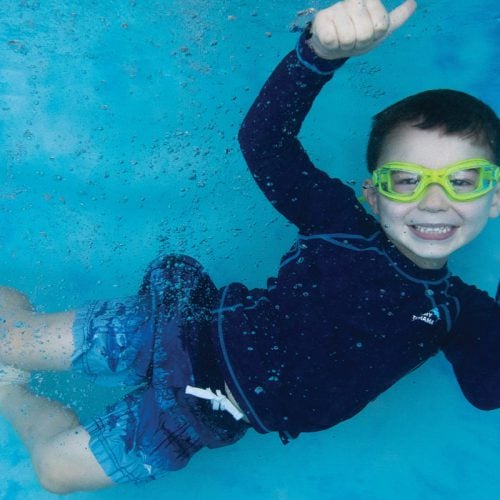 The statistics are scary. According to the CDC, 20% of all people who die of drowning are children under 14. Furthermore, an additional five children receive medical treatment for non-fatal drowning for every one who dies of drowning. Those children may develop lifelong disabilities from their drowning injuries.
The statistics are scary. According to the CDC, 20% of all people who die of drowning are children under 14. Furthermore, an additional five children receive medical treatment for non-fatal drowning for every one who dies of drowning. Those children may develop lifelong disabilities from their drowning injuries.
However, the CDC also recognizes swimming skills as one of the most important ways to prevent drowning, so it makes sense that you want your child to learn to swim. And we agree–swimming is an essential life skill that everyone should learn. It can be frustrating when your child is afraid to get in the water. But it’s also completely natural. Here are some reasons your child may be afraid of water.
Immaturity
Toddlers and preschoolers are beginning to explore the world and their role within it. Even if your child has loved bath time and wading pools since birth, he or she may suddenly develop a fear of water. Swimming pools or lakes may now seem huge and frightening. Your child may also become aware that water can be a source of danger.
While those fears are natural, your child has not yet matured enough developmentally to put his or her fears into perspective. It takes life experience to learn that while water can be dangerous, it can also be a source of fun and enjoyment, too.
A Bad Experience
A child who has fallen into the water has an obvious reason to be afraid. He or she has felt a lack of control in the water and may even have gotten water into his or her eyes, mouth, nose, and lungs. It’s a scary experience a child won’t want to repeat.
What’s sometimes less obvious to parents is such a fear can develop after a seemingly less dramatic experience, such as slipping in the bathtub, being splashed too much by a friend, or being pushed under the water by a sibling while playing in the pool. Those types of experiences can trigger a fear of submersion or simply of having water on the face.
Discomfort
A fear of water can also arise from discomfort. Some children are reluctant to reenter the water after experiencing the sensation of getting water into their eyes, nose, or mouth.
Children with autism or sensory processing disorder may have fears related to their feet leaving the floor in the water, the way sand feels, how sounds echo in indoor pools, etc. Those experiences may trigger a sensory meltdown, and children are subsequently afraid of repeating them by getting in or near the water again.
Observation
Children are always watching the people around them. If parents or others who are close to them are afraid of water, it’s likely they will pick up on that fear. News stories can also be a trigger. If your child has recently heard a news story about a drowning or shark attack, it can trigger a fear that those things will happen to him or her.
How You Can Help
If your child is afraid, start by determining the source of the fear. Be supportive. Don’t push your child to enter the water before he or she feels comfortable. Instead, make swimming, bathing, and being near bodies of water an enjoyable experience. Try having a family picnic near a lake, wading along the edge of a beach, or playing games in the bathtub.
Above all, stay positive and praise your child for every bit of progress made, no matter how small it may seem to you. With time, your child will feel more comfortable and look forward to being in the water.
Swim lessons can help. Our instructors have experience working with children who are fearful. We are happy to help them overcome their fears and learn to love swimming. If you’d like to learn more about Bear Paddle and how we can help your fearful child, contact us today.
